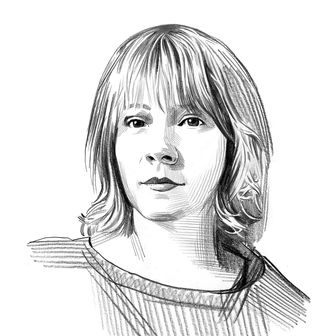
I don’t know if you’ve heard, but it’s tough out there for women. Alleged sexual predators are on the Supreme Court, every beloved actor turns out to be a super creep, and producers keep using our fingerprints when they commit a party murder.
Debette Goldry has been gracing Saturday Night Live for two years now. The veteran actress — played by Kate McKinnon and written by McKinnon, Sudi Green, and Anna Drezen — has been educating us on the scandals of classic Hollywood since before the Weinstein story broke. Drezen spoke to Vulture about the origins of the character, how to cope with trauma, and how often is too often to bring a sketch back.
Where did the character of Debette Goldry come from?
I did this character before I got hired at SNL, at UCB and different variety shows around town. My version of it was much dumber and with zero layers. It was just someone who was extremely old presenting an award. She was much less interesting and layered, and it was not about anything in particular. And then I wrote a sketch version of it a couple months before I got hired. I came in my first week to Chris [Kelly] and Sarah [Schneider], who were the head writers at the time, and I pitched them like five half-baked ideas. But then I said, “Oh, I also have this character, maybe for Kate.” And they said I should go write that with her. I didn’t realize that I was allowed to just, like, talk to the cast. I thought everyone had their own writers, and there were rules about that. But anyone can write with anyone, which came as a complete surprise. It was my first week, and I was still really overwhelmed. But my friend Sudi Green worked there, and she wrote it with me and Kate.
I saw Kate’s solo show at UCB in like 2011 and was such a fan of hers ever since; the thought of getting to write for her was so insane to me. She was so friendly and open right away and was into the character, and the stuff she was pitching as Debette made me laugh so hard. It all just made sense. It was a shock to have something work right away. I was very much prepared to fail for a long time before anyone heard my voice at all.
Why was that a shock?
It was an election year. They kind of told us, realistically, not to feel weird if we didn’t get anything on or even to table for a little while. So I was expecting to sort of blend in, or just not have that focus right away. I was really lucky to have Sudi. She had been there for a year before I got hired. She went, “Let’s do this, and this is gonna help it, and that is not a great idea.” It’s sort of like those exercises where you have to talk somebody across a high ropes course and they’re blindfolded. That’s what Sudi was doing for me. I absolutely would have written her having three eye patches, a walker, and a cane on her lap.
How familiar were you already with the abuses of classic Hollywood?
That was part of the sketch before I came in. I did the character, and then I wrote a sketch version that was about cartoonish “Clark Gable tied me to a rocket ship” kind of [violence]. But I’m not great at knowing actual facts. I’m great at knowing the general gist of something. Sudi also loves old Hollywood stuff, and she watches a lot of documentaries and interviews with old actresses. And she was really good at knowing things about … I don’t want to say anyone in particular because they’re not just characters. These people have families. But these stories are so insane.
The game of these scenes is that things have gotten so much better in the industry, but … have they?
We definitely bumped up against that. We did the sketch before #MeToo, so it was a way to call attention to the fact that actresses are treated poorly in a way that wasn’t strident. It felt like a safe way to talk about how things aren’t so great for women, and that people might not know that. That might be deep-cut information. So then when #MeToo happened, it kind of shifted the dynamic of the sketch. I was less interested in “You think you have it bad; I had it way worse,” and more in how it’s bad now, but it used to be cartoonishly insane — and involved tigers, and twilight sleep, and sham marriages. It’s just funnier, and now it’s insidious. You have to be a lot smarter if you’re going to mistreat women. You have to at least pay lip service to the idea of not treating women like absolute trash.
We definitely felt that when we did this one last week. This was a discussion that Sudi and Kate and I had been having since #MeToo: Is this character dead? We did it the week after the Harvey Weinstein stuff, and Kate felt like [Debette] learned something. We worried that might have killed the sketch character. But the subtle shift that we made, that we didn’t call out in the sketch, was making the game not “You think you have it bad; I have it worse,” but “Yes, I agree. Things are terrible. They need to stop marrying us off to chimps.” And the modern actresses say, “That does not happen.” Debette is trying to be woke, and be a part of the movement, but all of her experiences are not relatable.
It’s nice seeing an older actress character who’s an ally to this movement and okay with calling stuff out. I’m also not going to name names, so we have camaraderie about that.
Thanks.
But there are some older actresses who are very “Take your lumps. This is the way it is. Quit being a baby.”
I get that, too. If that kind of mistreatment was like oxygen when they were coming up, and they were able to survive it, then I completely get still having that mind-set. You don’t get to just unlearn your way of dealing with trauma. I wish that everybody was able to be supportive of what’s happening now, but I guess for some people it’s not an option to drop the hypervigilance that got them through. That was what enabled them to build their lives and careers, and you don’t get to just drop that.
Where did the name “Debette Goldry” come from?
I feel like women had names that were half a real name, but also a little bit made-up. They’re all stage names, so it was like, “Okay, there’s gonna be something glittery, or about gold or a garland. And then it’s gonna be a name that is currently ugly but would have seemed really sexy in the ’50s.”
Let’s talk about that fake neck!
Oh my God, yes! It’s the star. Louie is our makeup person. He makes so many necks and noses and earlobes. The amount of fake elderly necks they have for Kate McKinnon in that building is upwards of a dozen, I imagine. They do face and neck casts of the whole cast when they get hired. It’s called a wattle — these hideous plasticky, rubbery things that get taped onto these gorgeous people. I feel bad anytime I write anything that involves someone having something spirit-gummed to their face. But it’s really magical.
The first time we did [Debette], at dress, she had a lymph-node leak. And it shot clear fluid onto someone. So the first version of the neck had a pump that would shoot fluids. We were given the note to please not have that happen.
When do you know to bring back a recurring character? Do you want to let it rest for a time, or is it brought back by current events?
It’s definitely a balancing act. Usually anytime there’s a female host, we talk about doing a Debette. But you don’t want to bring it back too many times. When Chris Pine hosted, he wanted to do one. That got cut after dress. So sometimes a host is into it, or it gets ordered by the higher-ups, but we can feel it in the wind when it’s time.
What inspired it this time for Awkwafina?
The iPhone just updated its messaging app, so the GIFs are much more central. And I opened it, and one of the GIFs was Debette. And I sent it to Sudi, and she was like, “We should do it this week.” And I was like, “Okay.”
That is such a shitty story, but it is simply what happened. I’m also obsessed with Sandra Oh, and it was cool that she could play her. It’s such a look, and I had just watched the SAG-AFTRA Killing Eve panel. She is such a good impression for that kind of thing.
It was a really good opportunity to comment on white people playing roles that are supposed to be people of color.
It’s really crazy that it was okay for so long. I watched Scarface for the first time recently — huge brag! — and it’s Al Pacino and whatever boy actor who’s with him, playing basketball. And behind them are all Cuban extras. No one seems to care that these are two white people and they’re surrounded by people who are actually Cuban. It was such a practice for so long, and it still happens. It’s kind of the whole ethos of the Debette character. These things are so hideous, but they’re so obvious that it’s almost funny. And “almost funny” is my brand, so that really works.


